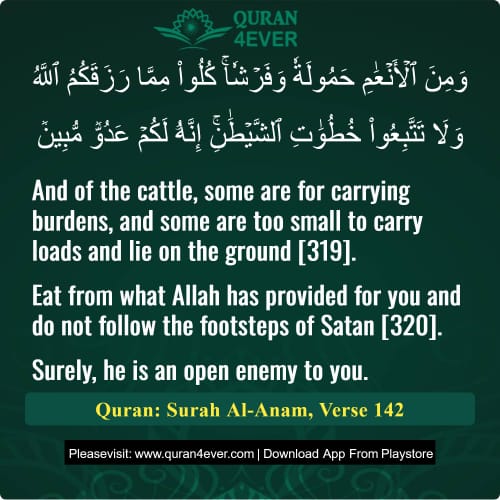
Transliteration:( Wa minal an'aami hamoolatanw wa farshaa; kuloo mimmaa razaqakumul laahu wa laa tattabi'oo khutuwaatish Shaitaan; innahoo lakum 'aduwwum mubeen )
“And of the cattle, some are for carrying burdens, and some are too small to carry loads and lie on the ground [319]. Eat from what Allah has provided for you and do not follow the footsteps of Satan [320]. Surely, he is an open enemy to you.”
This verse distinguishes between cattle used for transport, like camels or oxen, and smaller animals, like goats, sheep, or chickens, that rest close to the ground. All of them are lawful for consumption, and Allah has created them for both benefit and food.
To prohibit any animal without divine proof is following the path of Satan. What Allah has not forbidden is lawful. Even if animals or fields were previously linked to idol worship, if acquired lawfully, they remain permissible. Therefore, neither the Ganges water nor cow flesh becomes unlawful simply due to their connection with idolaters, unless explicitly prohibited by Allah.
The tafsir of Surah Al-Anam verse 142 by Ibn Kathir is unavailable here.
Please refer to Surah Anam ayat 141 which provides the complete commentary from verse 141 through 142.
(6:142) And of the cattle (He has reared) some for burden, and some whose flesh you eat and whose skins and hair you use to spread the ground.[117] Eat of the sustenance Allah has provided you and do not follow in the footsteps of Satan, for surely he is your open enemy.[118]
117. The word “Farasha” (which means ‘to spread, to pave, to cover the ground, floor or path’) has been used in the context of cattle either (1) because they are relatively short, and in moving about seem to be touching the ground, (2) because when they are slaughtered, they have to be laid on the ground, or (3) because their skins and hair are used for furnishing purposes.
118. It becomes clear from the context that God wants to emphasize three things. First, that the orchards, fields and cattle are all bounties of God. No one else has made any contribution to them and hence no one is entitled to any share in the thanks that man ought to give Him in return for these bounties. Second, since all those things are bounties of God, one ought to follow the laws of God alone while making use of them. No one else has the right to regulate their use. To acknowledge oneself bound by customs and practices laid down by others than God, and to make offerings out of a feeling of gratitude for beneficence to someone other than God constitute acts of rebellion and amount to following Satan. Third, as God has created all these things for the fulfilment of man’s needs, they should not be unnecessarily suspended from use or be regarded as prohibited. All restrictions on the use of the means of sustenance and other bounties of God based on conjecture or superstition, are not to His liking at all.
[356]- As the disbelievers have done in making their own rulings about what is permissible and what is prohibited.

For a faster and smoother experience,
install our mobile app now.
Related Ayat(Verses)/Topics